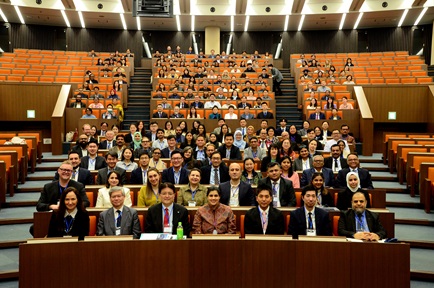Nigeria's business prospects, investment opportunities to grow in government's 2nd term
Nigeria's President Muhammadu Buhari successfully secured a second term. The domestic and international investment community is curious about what the policy priorities of the new administration will be.
By Ronak Gopaldas

Nigeria's President Muhammadu Buhari successfully secured a second term at the helm of Africa's largest economy. Despite the controversial circumstances surrounding the run-up to the February poll, this was a convincing electoral result and provides a strong mandate for the president and his All Progressives Congress (APC) party to deliver on his electoral promises.
Mr Buhari secured 56 per cent of votes cast, compared with the 41 per cent garnered by his main opponent, Atiku Abubakar. In total, he won an electoral majority in 19 of Nigeria's 37 administrative divisions. The ruling APC also secured a majority in both the Senate and the House of Representatives, a clear boost to its policy agenda.
With the post-election dust now beginning to settle, attention has turned to what the contours of a second Buhari term might look like, particularly in relation to the economy. Unlike 2015, there will be no honeymoon period extended to the incoming Buhari regime. Back then, a "Buhari dividend", stemming from the euphoric handover of power, led to an extended period of goodwill. However, a series of policy missteps soon undermined confidence in the economy. Conversely, the external environment is more favourable this time around, with oil prices more buoyant and external factors more supportive.
Against this backdrop, the domestic and international investment community is curious about what the policy priorities of the new administration will be.
Broadly speaking, Mr Buhari will continue to place a strong emphasis on rooting out corruption, infrastructure spending, as well as prioritising fuel and forex stability. Wild deviations from this are unlikely, both in the short term and medium term.
From a monetary policy perspective, the Central Bank of Nigeria governor, Godwin Emefiele, recently had his term extended by another five years. His retention is a first in a Nigerian context - no other central bank governor has stayed on for a second mandate since the advent of democracy in 1999.
An extension of Mr Emefiele's tenure will likely signal the government's persistence with multiple exchange rates in its bid to ensure stability of the naira. As such, a free-floating currency would be highly unlikely. Although businesses will be disappointed by the lack of market-friendly liberalisation policies, some investors would welcome the continuity and certainty another Emefiele term brings. Regardless of who is appointed to head up the apex bank, the policy outlook will remain broadly consistent with the status quo.
POLICY CONTINUATION
Fiscally, the appointment of a new finance minister will also be watched with keen interest. Mr Buhari will likely be quicker in forming his new Cabinet than in 2015, which should be positive for market sentiment. According to a research report by Agusto & Co, Mr Buhari in his second term would have to work to raise revenue while also restructuring government spending. This, it noted, would require politically unpopular but inevitable choices to offset growing fiscal pressures. Here, the key issues remain the adjustment of exchange rates, electricity tariffs and petrol prices - all to reflect market fundamentals. Other key issues such as the minimum wage, VAT increases and power sector reform will also feature strongly, as the government faces pressure from the IMF to step up reform efforts.
This leads to the question about whether Mr Buhari, no longer burdened by the challenge of re-election, will adopt a more market-friendly approach to the economy.
That he is an economic nationalist is no secret. The unorthodox and often draconian manner in which the current administration has dealt with regulatory issues relating to the private sector has rattled investors who remain wary about the unpredictable policy landscape. More than anything else, investors are looking for clear, transparent and coherent policy. Their hope is that Mr Buhari's second stint will be less eventful than the first.
Discussions with the business community in the country indicate there is some optimism that Mr Buhari's second term may see fewer populist inclinations and an environment which is more accommodating of the private sector's agenda.
There are two main reasons for this. First, the context this time around is vastly different from that in 2015. With oil prices more stable and some way off the lows of 2015, there is more room to manoeuvre and consequently scope for a more pragmatic approach. Second is the influence of the vice-president. Markets place a lot of trust and confidence in Yemi Osinbajo and his ability to influence policy in a more reform-oriented direction. Indeed, the biggest shift in policy occurred during Mr Buhari's extended absence when Mr Osinbajo took control of the economy. The continued strong working relationship between the two men has created a sense that a more practical rather than ideological stance to policy will be adopted in Mr Buhari's second term.
While there might be a directional shift, the chances of a major policy pivot are extremely optimistic. That said, working off the current low base and with a more supportive global backdrop, "neutral is now the new good" and may actually be sufficient to revive "animal spirits" and boost investor sentiment.
All considered, the stability brought about by a Buhari victory will facilitate a relatively quick transition and provide a sense of certainty for businesses which had adopted a wait-and-see attitude ahead of the election. With the risk of a messy transition mitigated, attention will shift to the policy landscape and personnel changes, where the most likely scenario is that the country continues to trudge along on its current path. Fiscal and monetary policy will remain broadly consistent, with growth remaining constrained in the absence of meaningful reforms or a major oil price spike.
The writer is a director of Signal Risk. He is also a consulting researcher for the NTU-SBF Centre for African Studies, a trilateral platform for government, business and academia to promote knowledge and expertise on Africa, established by Nanyang Technological University (NTU) and the Singapore Business Federation (SBF).
Source: The Business Times, 22 May 2019







